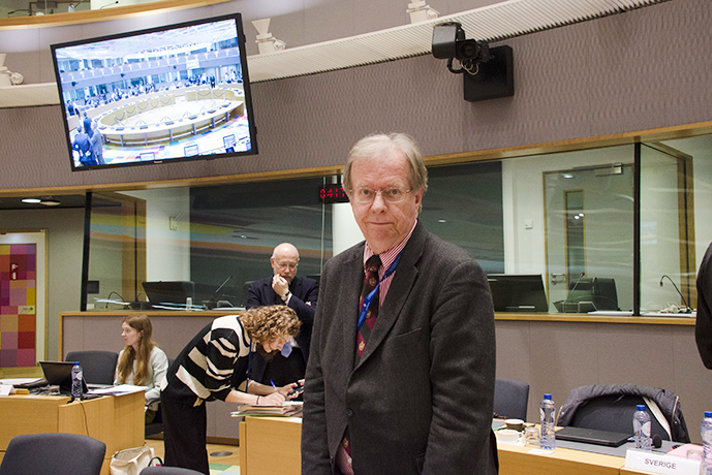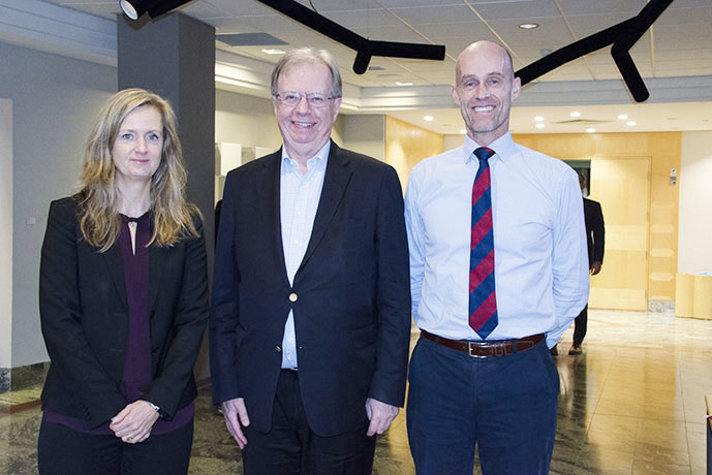Critical issues and the future of the EU
Published
As head of the Permanent Representation of Sweden to the European Union, Lars Danielsson represents the Government on a range of important EU issues in Brussels. This work offers him an insight into the EU’s political dynamics shared by few others.
Lars Danielsson left his position as Sweden's Ambassador in Germany and moved to Brussels almost eighteen months ago to take on the role of head of the Permanent Representation of Sweden to the European Union.
"This year will be a year in which we address in earnest the EU's common future issues, as we will start negotiating the next budget period.
At the same time the future relationship between the EU and the United Kingdom will be negotiated. We cannot yet anticipate all of the consequences of Brexit, but it is complicated to undo the ties that have been created over a long period and I think we're just beginning to understand how substantial the change will be," says Lars Danielsson.
Fisheries is one example of an area where there is a risk of underestimating the technical issues, he points out. The EU has a common fisheries policy and the UK is one of the EU's largest fishing nations.
But neither the budget negotiations nor Brexit is the EU's most important issue overall and over time.
"No, it's what's happening with euro cooperation," says Lars Danielsson.
"Personally, I believe that in the longer run it is how the euro performs and deeper monetary cooperation that will determine how things work out for the EU. And this is also an important issue for Sweden, not least because our most important export countries have the euro as their currency," he adds.
Last year was a strong year for the EU
The EU's difficulties in dealing jointly with the migration situation and the advent of Brexit were what marked 2016. Many people saw it as a tough year for the EU, but in comparison 2017 in many ways turned out to be a good year for the EU, Lars Danielsson believes.
"Brexit did not create the internal divisions in the EU that many feared. There are differing views in the EU on how quickly cooperation can progress in various areas, but the main thing is that the Member States are behind an EU that sticks together.
And the issue of climate change became a constructive force in 2017; the EU took a leading role as levels of support fluctuated in various parts of the world for the global climate agreement that was signed in Paris in autumn 2015," he explains.
With the Social Summit for Fair Jobs and Growth in Gothenburg in November 2017, the Swedish Government took on political leadership on a number of social issues. Lars Danielsson points out that the summit made an impact but that the results will take time.
"It is primarily a matter of setting political priorities that take account of social factors, rather than of legislating. The Swedish model will endure. The Government hopes that the social aspects of labour market issues will be integrated into decision-making processes in the same way as work on climate change," he explains.
Among the EU's most recent successes, Lars Danielsson points to a consensus among the Member States on the need for the EU to cooperate more strongly on security issues. This means cooperating on common security problems such as terrorism and cyber threats.
"I did not think this was possible as it was so controversial in the late 1990s and early 2000s to talk about security and defence in an EU context. But that is no longer the case. The Government has been a driving force on these issues and I think we should be proud that the EU has managed to help build a more secure Europe in such a short time," states Lars Danielsson.
Budget a challenge despite economic recovery
The economic crisis in 2008 and 2009 hit many EU countries hard. Lars Danielsson recalls that although the figures vary, all EU countries are experiencing economic growth now. An improved economy is better for the EU's ability to agree, he believes.
"The fact that our economies are growing should also be seen in the light of the single market, which celebrates its 25th anniversary this year. It is a fact that the single market works and is constantly contributing to the EU's prosperity. People often forget this," says Lars Danielsson.
Growth in the EU countries should also create a very good starting point for the negotiations on the multiannual financial framework for the period 2021–2027, which have got under way. When the heads of state and government met at the end of February, they agreed to prioritise defence and security and the Erasmus programme and to deal with irregular migration. But how the major loss of funding when the UK is no longer paying into the EU will be dealt with is one of the more difficult questions in the negotiations.
"Despite growth in the EU, this negotiation will likely be one of the most difficult budget negotiations that the EU has had, partly because of Brexit. The EU also needs to be better at linking visions with the actual budget," Lars Danielsson points out.
Sweden is one of a small group of net contributors and budget-restrictive countries that believe that when fewer countries are contributing to the budget, the expenditure must be adjusted downwards.
The Government has also been clear on the need for conditionality, in other words the need for Member States to reach agreements on areas such as migration and follow the rule of law if they are to receive full regional support payments. The budget negotiations are therefore placing the migration debate in a new light, with a minority of Member States continuing to object to taking responsibility for asylum seekers in a spirit of solidarity.
A new agenda for prime ministers and presidents
"To resolve the budget and other priority issues, the Leaders' Agenda is extremely important," says Lars Danielsson, referring to the special work programme presented by European Council President Donald Tusk last autumn, lasting until June 2019.
The Leaders' Agenda contains migration issues as well as security, the future of the single market, trade, monetary cooperation, environment and climate, and more.
"The Leaders' Agenda is not a vision, it is an agenda to determine when the EU heads of state and government will reach agreements and on what. It is a new way to structure the discussion on the future of the EU," says Lars Danielsson.
The Permanent Representation of Sweden to the EU is Sweden's largest mission abroad. Posted officials from all ministries make the Representation a Government Offices in miniature, with expertise in essentially all EU areas.
"We are an organisation that negotiates, and it is a great strength of ours that we have such a solid system of preparation at the Government Offices in Stockholm. This means that we are well-prepared when we negotiate. We have viewpoints and do not just sit quietly. Some might think we are difficult, but so we should be, says Lars Danielsson.
We act on issues that are current and politically important in Sweden and in the EU. At the same time, we must think long-term in all of the widely differing issues we deal with. It is an interesting challenge to pitch my involvement at the right level in terms of when I should go into detail. All of this makes this a very special workplace, which I very much enjoy managing," concludes Lars Danielsson.



 X
X